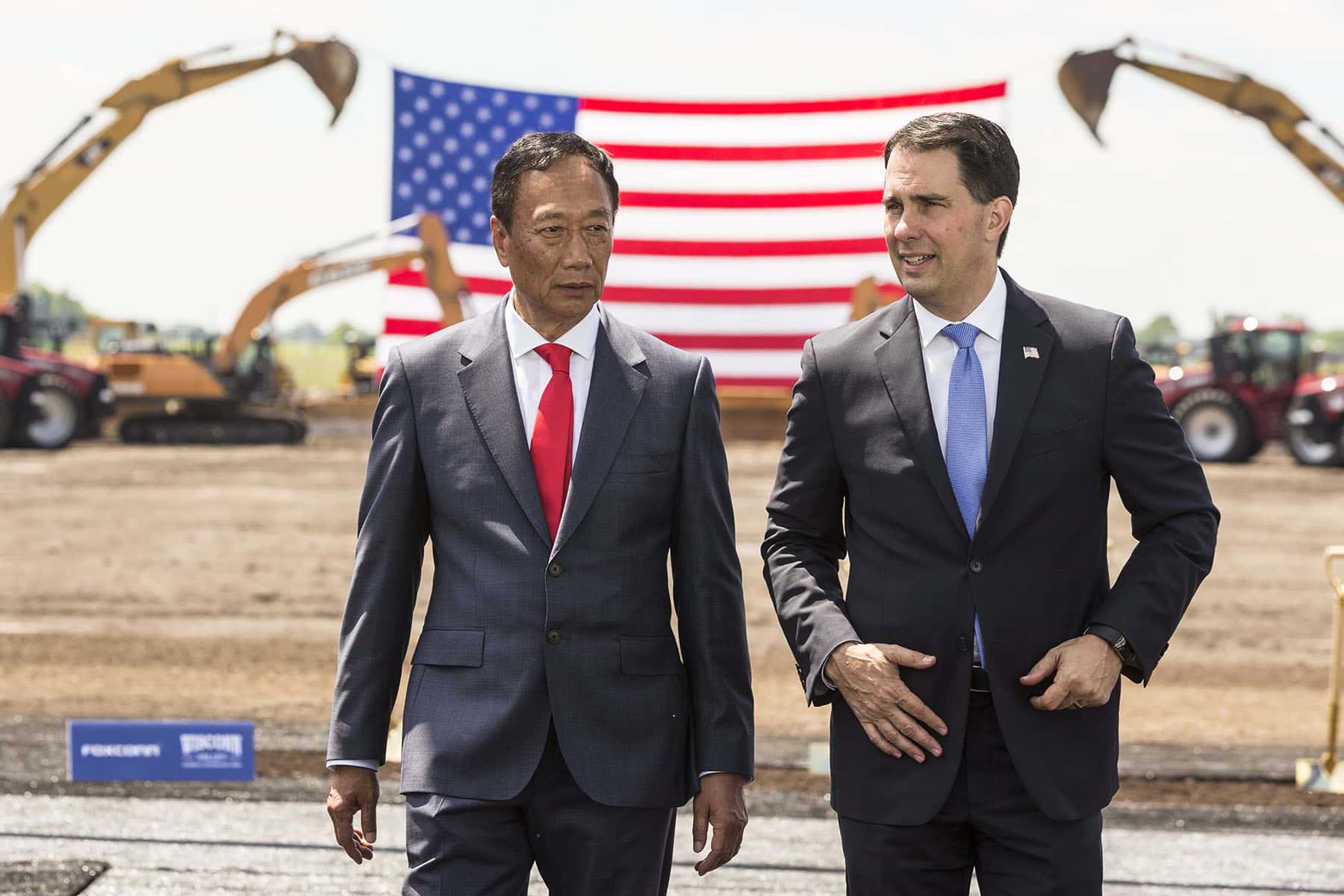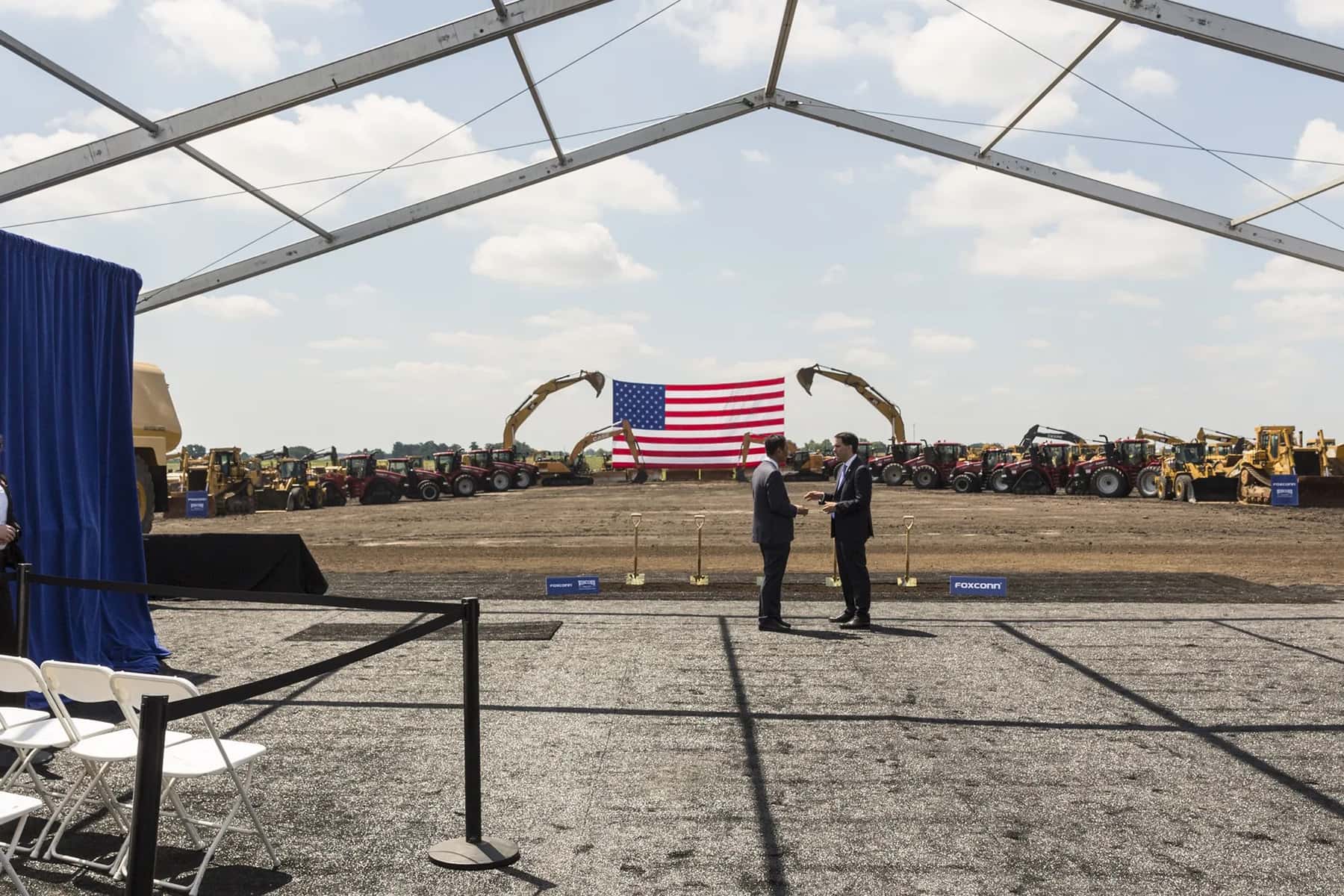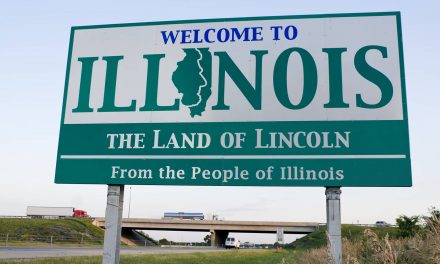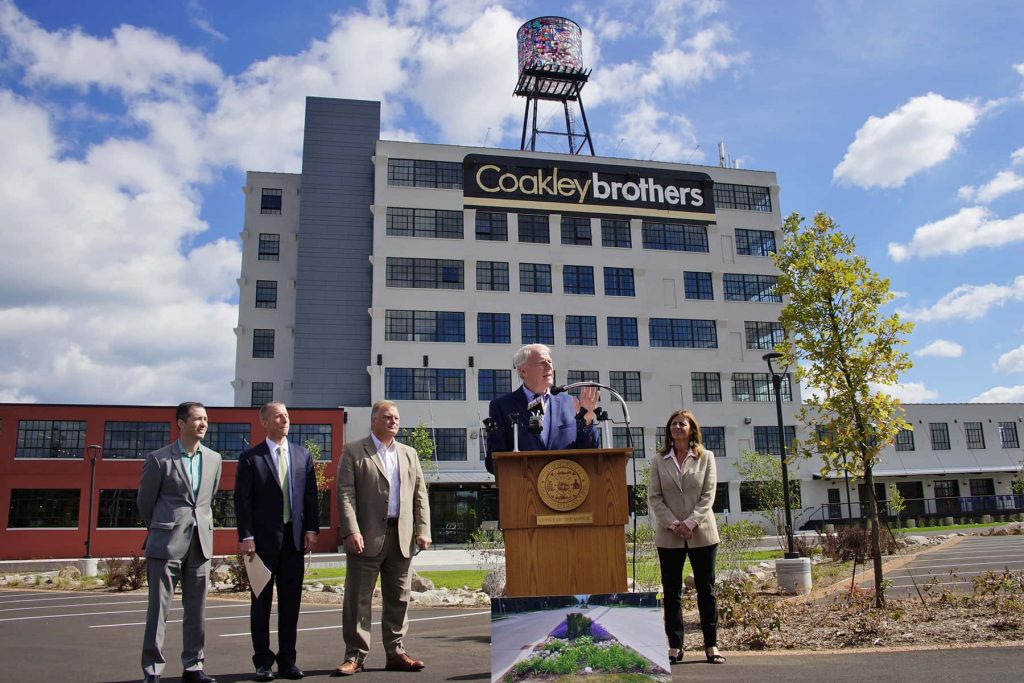
When then-President Donald Trump held the first White House press conference in 2017 to tout the prospect of a massive television flat-screen factory for the Taiwan manufacturer Foxconn coming to Wisconsin, Madison writer Lawrence Tabak was immediately intrigued.
“If nothing else, as a Wisconsin taxpayer, I was concerned that this was going to be a major spending event for all of us who live in Wisconsin,” Tabak said.
It also had a deja-vu quality. Two decades earlier, Tabak had written a takedown for The Atlantic on the endless building spree of convention centers from one city to the next, driven by a revolving-door coterie of consultants who predicted they would revitalize local economies.
“It reminded me a bit of what I suspected was behind the enthusiasm for the Foxconn project,” Tabak said. “Which turned out, of course, to be exactly the case.”
Four years after that White House announcement, Tabak has written Foxconned: Imaginary Jobs, Bulldozed Homes, and the Sacking of Local Government, recounting the story of that ill-fated factory in the Racine County village of Mount Pleasant. The plant has yet to produce a single flat screen, and it has filled only a fraction of the 13,000 jobs that the administration of Governor Scott Walker had promised in return for the state’s $3 billion in tax credits.
While local officials continue to profess faith in the future of the site, plans for what the factory will actually do keep changing. The latest blow came in October as the prospect of manufacturing electric cars evaporated. More than an exposé of the Foxconn project itself, Tabak’s book is a critique of the approach to economic development of which the project is emblematic: the notion that government largesse can lure big employers to relocate and bring jobs that will transform a community, region or state.
Foxconn’s original promise of 13,000 jobs tripled to 35,000 in spillover jobs, and there were visions of a Foxconn-sparked technology cluster to be called “Wisconn Valley.” Walker handed out buttons emblazoned with the name at a meeting with business leaders in Milwaukee after he returned from that 2017 White House announcement of the project.
Tabak calls that “a ridiculous premise, as we’ve seen in what’s happened over the last four years, but that was perfectly predictable.”
“How did Detroit become Motor City?” he said. “How did Pittsburgh become the steel capital of the United States? How did Silicon Valley pop up in Northern California? It wasn’t because a government entity and a city council or the city fathers sat around together and said, ‘You know what? We need to give Henry Ford a couple million dollars to build a factory here.’ These things happened organically.”
Beyond the project’s $3 billion price tag in the form of state tax credits, and the $1.5 billion in additional debt that the village of Mount Pleasant has incurred to provide infrastructure support for the site, there has been a human cost.
Tabak describes the political fracturing in Mount Pleasant and the role of local political activist Kelly Gallaher, who through social media has focused attention on the fiscal strain that Foxconn would impose on the community. He also includes accounts of local homeowners whose homes were seized by the village under eminent domain to make room for Foxconn’s plan, as well as Kim and James Mahoney, who were also threatened with losing their home but succesfully fought back.
“I got to know some of these people who were devastated by this,” Tabak said. Stories of how homes were destroyed by the project resonate across the political spectrum, he adds. “It doesn’t matter if you’re a progressive Democrat or a Tea Party Republican — that’s one thing you can both agree on that’s beyond the pale.”
‘Economic development complex’
Tabak sees Foxconn as an especially dramatic example of what he calls the “economic development complex” of consultants, contractors and public agencies or public-private partnerships driving relocation deals where taxpayers bear the cost. It places the narrative of the project’s sale to Wisconsin and its subsequent merry-go-round of plans against larger, overlapping contexts that help explain why that sort of economic development finds such ready reception.
Globalized industry and capital have sent good-paying jobs around the world to lower-wage havens, automation is remaking workplaces, especially in manufacturing. Yet Foxconn and its Wisconsin champions promised good-paying, blue-collar jobs when, in reality, comparable plants around the world are heavily automated, with the high-salary positions requiring extensive education. Even before lawmakers voted to approve the company’s incentive package, Tabak researched a large-panel factory in Japan that was the most similar plant he could find to the one Foxconn was proposing.
“It was pretty much the model for what would be built in Wisconsin,” he said.
It was operated by 1,000 workers, less than 10% of the number pledged for Mount Pleasant. Those jobs, and jobs at other, comparable plants he looked at, were mostly for engineers and technicians, not jobs that could be filled with high school graduates. In August 2017 Tabak interviewed a Texas expert on automated production.
Mark Fralick told him, “Foxconn has a long history of overpromising and underdelivering. I just hope the government entities and municipalities involved don’t get screwed.”
When Tabak wrote about those findings for the online outlet Belt Magazine, he said, he found a “surprising lack of industry and exploration and curiosity from the politicians and state officials who were enthusiastically supporting the billions of dollars of incentives” that the Walker administration and the state Legislature threw at the company.
“Foxconned” observes other inconsistencies between how the company acted and what its government backers preached.
The project’s most enthusiastic supporters allied themselves with Trump, who had campaigned with harsh attacks on undocumented immigrants as “illegals.” But Tabak visited a Foxconn plant in Indiana in 2017 and heard about the widespread use of undocumented immigrant factory labor there as well as the company’s reliance on the federal H-1B visa program to hire “mid-career engineers from Asia who would work for less than a fresh engineering graduate from, say, Purdue University,” he wrote.
He also juxtaposes Assembly Speaker Robin Vos, “one of the biggest boosters of the project,” with the lawmaker’s advocacy for a bill in 2006 to rein in the very eminent domain powers that Mount Pleasant used to acquire a tract of land that sprawled over more than 6 square miles.
Those contradictions were “pure hypocrisy,” Tabak said. “It was astounding to me that a group of people who declared themselves Tea Party Republicans, whose premise was free enterprise, small government and America first, could be so enthusiastic about giving our tax money to an Asian corporation with such a jaded history. It just made no sense.”
Overlooking visible evidence
The political leaders who embraced Foxconn, Tabak contends, were operating from a “kind of faith-based economic policy” that overlooked evidence visible from the start that the promises the company made weren’t viable. And he writes off Walker’s embrace of the project as a purely political calculation, “a huge splashy event that he thought would save his election” in 2018, he said — one that backfired in the end.
Tabak said he was not certain whether Walker and his associates knew it was a bad deal and didn’t care because it served their political agenda, or whether they were simply duped by the company and its bargaining team. Regardless of the answer, the beneficiaries of the project were “well-connected consultants and contractors,” he says — “a small circle of insiders who have made out like bandits.”
Government can play a role in fostering jobs and economic prosperity, Tabak said — not by doling out cash incentives to lure employers, but by investing in resources such as the university system that can be an “engine … for really high-quality jobs.”
Since Gov. Tony Evers defeated Walker in that 2018 election, the Wisconsin Economic Development Corp. (WEDC), which figures heavily in his book for its role in promoting Foxconn, has shifted to “more fundamental developmental work rather than big-ticket economic splashes,” Tabak said.
But he worries that the U.S. continues to be in the grip of bidding wars among states, to the detriment of communities and the economy as a whole. The state’s renegotiation earlier this year of the Foxconn agreement was arguably forced on the Evers administration, Tabak said. “It was in their interest to come up with a deal that would keep Foxconn active in Wisconsin, and incentive to pay its property taxes.”
Because of how the original tax credit deal was written, the state hasn’t yet had to write checks to Foxconn. But Racine County and Mount Pleasant still have the local debt for roads and site development they incurred hanging over their heads, he observes, and Wisconsin is still bound by a “moral obligation” to support those bonds written into the original legislation.
“You and I and other Wisconsin residents,” Tabak said, “are going to be paying the price of that — backing those bad decisions that were made by local officials.”
Erik Gunn
Аndy Mаnіs and The White House
Originally published on the Wisconsin Examiner as New book examines lessons in the Foxconn story
Donate: Wisconsin Examiner
Help spread Wisconsin news, relentless reporting, unheard voices, and untold stories. Make a difference with a tax-deductible contribution to the Wisconsin Examiner
















